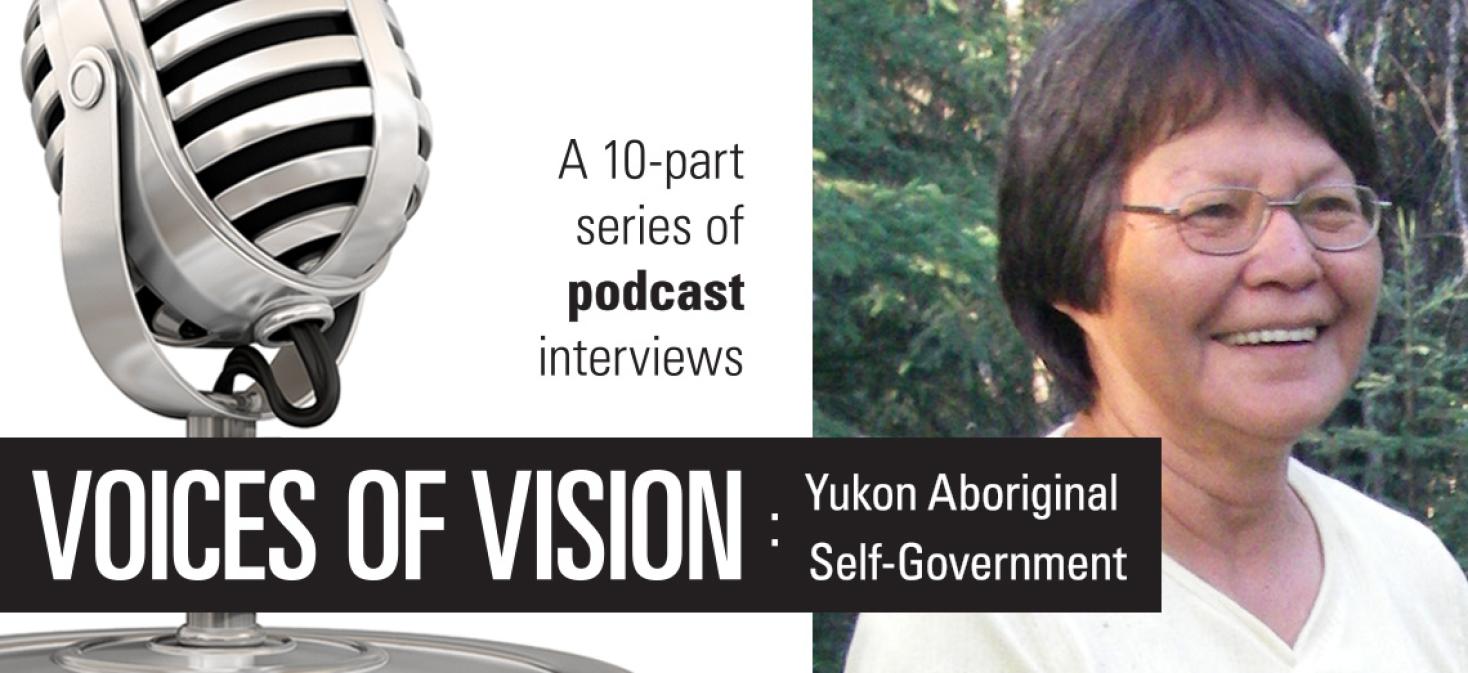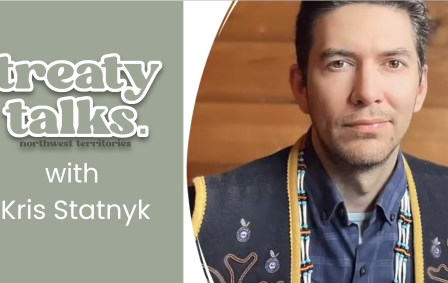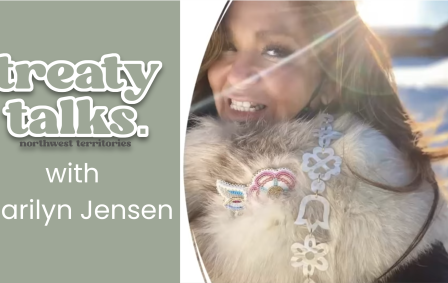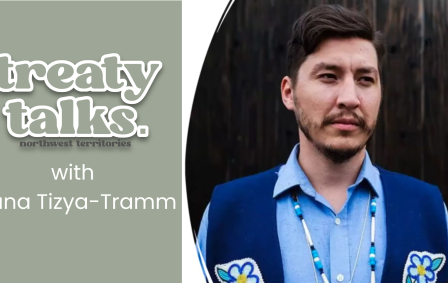Voices of Vision: An interview with Angie Joseph-Rear

Angie Joseph-Rear was active in the self-government process as a Chief, councillor and community member. Her work ensured the Tr'ondëk Hwëch'in's land claims agreement reflected the values and aspirations of the Hän people.
Angie was the Hän language teacher at Dawson City's Robert Service School for nearly a decade before becoming the Tr'ondëk Hwëch'in's language coordinator. With the assistance of fluent speakers, Angie brings the Hän language alive for interested learners. Angie is a survivor of residential school and, along with her peers, has helped others deal with their residential school experience through the K'änächá group, a Dawson City-based group of former residential school students. Even with her busy schedule, Angie still finds time to enjoy the land that has sustained her culture for thousands of years.
Consult the glossary of terms used in the Voices of Vision podcasts.
Back to Voices of Vision podcast series
Transcription
00:00:00
MEAGAN PERRY (VOICE OVER): Tr'ondëk Hwëch'in is the First Nation with traditional territory in and around Dawson City, the home of the Klondike gold rush of 1898. They belong to the Hän people. A century after the gold rush, in 1998, Tr'ondëk Hwëch'in became a self-governing First Nation, a part of Yukon's unique vision of modern-day aboriginal self-government. Now let's meet someone who knows a lot about it.
ANGIE JOSEPH-REAR: Self-government, it's almost like “take back your life” and my – this is personal; my own personal opinion – take back the way our people once was. Hello, my name is Angie Joseph and I've been involved with our First Nations Government for years.
MEAGAN PERRY (VOICE OVER): Angie Joseph-Rear was also Chief of Tr'ondëk Hwëch'in from 1987 to 1990, and as a Tr'ondëk Hwëch'in Elder she has paid close attention to the way the Yukon's internationally recognized approach to aboriginal self-government has affected her First Nation. I'm Meagan Perry. When I called her up on the phone Angie Joseph-Rear told me about Tr'ondëk Hwëch'in history, modern-day aboriginal self-government, and what self-government and land claims implementation has meant for Tr'ondëk Hwëch'in.
00:01:07
ANGIE JOSEPH-REAR: Tr'ondëk Hwëch'in had a long history prior to the gold rush. At one point in time Chief Isaac in those days had documented our land. It goes way up north towards certain place and up, down that way over and this way, and he had described our area, our traditional territory. And then there's the Kandik map and that too described the Hän traditional territory. So we went with it, although prior to our young people growing up and taking over we had, at the beginning of land claims, we had a fear of our elderly people who could remember and who could document these traditional territory. And so they did and everybody was satisfied. And then we come along and start having overlaps and – [laughs]
MEAGAN PERRY: Now tell me about how you became involved in working towards self-government and land claims agreements and their implementation. Was there a personal connection to the work for you?
ANGIE JOSEPH-REAR: Oh absolutely. I remember when I was young and when the pipeline came through. Well we don't forget now we had a great leader named Elijah Smith. He founded the Yukon Native Brotherhood and through that time he was talking about Council for Yukon Indians (CYI). And on his plate also, he was working toward land claims. He had a group of good Chiefs around the Yukon to support him. And they went to Ottawa in '73 and they presented Trudeau – Pierre Trudeau – with a petition called Together Today for our Children Tomorrow, and that is the foundation and that is the base for our negotiation toward land claims along the way. True enough, it was difficult. I think in the first place that the First Nations and the federal government – which would be the Crown at the time – were the two governments that were to be negotiating. But along the way we invited Yukon Government so it became a tri-party, and that became difficult. And through our long journey to reach a final agreement we also negotiated a self-government agreement. A self-government – it's almost like “take back your life”. And my – this is personal; this is my own personal opinion – take back the way our people once was. We can govern ourselves. We have the ability to manage ourselves. But we were not along the way given a chance because the Indian agents, Indian Affairs, came about throughout our lives.
MEAGAN PERRY: And that's the Department of Indian Affairs you're talking about?
00:04:10
ANGIE JOSEPH-REAR: Indian Affairs, yes. We used to call them Indian Agent. According to the federal government that was their job. “I'll take your life.”
MEAGAN PERRY: So what was it that sparked your interest in land claims?
ANGIE JOSEPH-REAR: Well it was something so grasping at the beginning, you know, we had the – through Together Today for our Children Tomorrow – I never really understood the petition at the time – along the way as our Chief worked toward it. And then came an association called Yukon Association for Non Status Indians, because the Yukon Native Brotherhood was a Status or Registered Indian association. So they came about – in the '75, '76 area the pipeline discussion came about. And they visited all the Yukon communities, and it just made us more want and more interested that we should settle claims before any development occurred, particularly the pipeline.
And really because all the young people were so involved at the time they just got gung-ho interested, and from that time on – then our Chief at the time was Percy Henry and he really encouraged me. It's just like he was behind me, just pushing me, and that was his way of getting young people involved. And he really encouraged the young people always. And when he became a Chief who – the movement started in '68 – he moved forward in the community. Through their big meeting, their All Chief Meeting, they decided to open up an office. And so he made a deal and they gave him a building and he started an office. And then Yukon College wasn't even on that hill yet but there was this group of committees that were talking about maybe perhaps having a big college in Yukon. And so in the meantime there was Mr. Braedon who was our instructor and he instructed us. One was for the Band Manager and the other one was for the Band Secretary. And he – he just submitted my name and another person's name. Just all of a sudden we were in the course. [laughs] So he encouraged us very much, and I absolutely today even know that he would still be my foundation in where I go.
MEAGAN PERRY: And you ended up being Chief eventually, right?
00:06:52
ANGIE JOSEPH-REAR: I did in '87 to '90.
MEAGAN PERRY: Did you think of him a lot during that time?
ANGIE JOSEPH-REAR: I did. And because I was so involved prior to that through negotiation at a First Nations level and just being totally involved with where we want to go. We had Chiefs before me and I was Council then. And, you know, we start looking at taking care of ourselves. “We can take care of ourselves” was our method at the time. We did really well. We sit in the city and we exchanged lands. And for instance we had a little piece of land up the hill – just a small, little piece. It's probably about a hectare. It's not really big. And in exchange for that piece of land we had about – we agreed to at least a five, two to three hectare lots up the Dome way. So stuff like that.
MEAGAN PERRY: And now I want to talk to you a little bit about implementation of self-government because that's a process that requires a long-term commitment and participation from all the parties – you know, the federal government and the territorial government and the First Nation. What have been the big issues for Tr'ondëk Hwëch'in?
00:08:05
ANGIE JOSEPH-REAR: You know you look at three parties. Federal government is just sitting aside now. So the big war, I guess, would be between the First Nations and the Yukon Government. That's why today I'm so sad that we allowed them to sit at the table. You agree with me?
MEAGAN PERRY: I'm listening.
ANGIE JOSEPH-REAR: We have other people.
MEAGAN PERRY: [laughs]
ANGIE JOSEPH-REAR: Yeah, you know, it becomes a tri-party and it just don't work because in the first place our petition was for the federal government. We were on Crown. The Queen of England had taken our land and said that she'll keep it in trust for us and we had trusted her. And then she turned. You know, along the way through negotiations we had to do research and studies and under Rupert's Land Order and the Crown and the Constitution and all these things. And the implementation and lands issue – we have small lands. We negotiated a small portion of the land here. But if it's small, it's what we can do with it, what we can make of it because here we are – we in this Dawson First Nations, Dawson Community, Tr'ondëk Hwëch'in traditional territory, we have other land interests like mining – it's ripping up and turning all the land. And for a small piece of land we're always looking at it.
MEAGAN PERRY: From what I know about Tr'ondëk Hwëch'in, the First Nations has always been really active in terms of negotiating space and negotiating with European settlers because the gold rush was in that area. What did you hear about the time during the gold rush from older people when you were young? And you were negotiating these same issues, right? Back then?
ANGIE JOSEPH-REAR: You know, even today Chief Isaac is still our backbone. He's long gone. Like he died in 1932, but if you walk around with our people and walk and take a tour or even come to the Moosehide Gathering or even on the street or at our General Assembly, Chief Isaac's name will always come up. You know that Chief Jim Boss had the words that started our land claims, but Chief Jim Boss came down and him and our Chief Isaac had visited and had long discussions amongst the two of them. Jim Boss went back home and our Chief was here. Our Chief apparently went to the Commissioner's house and then he made a big speech about needs. I want a school. I want blankets. I want – I need school for my kids. And all this kind of stuff. He told King somebody. I want all these, and if you don't meet my demand, I will sell my Yukon. And he was a really strong spokesperson. For everything – even so much as people go to jail or something – he comes right up, and he was so outspoken. So he's our backbone today. He still is.
MEAGAN PERRY: When you look back on the years you've worked to develop self-government in the Yukon, what do you think about?
00:11:12
ANGIE JOSEPH-REAR: It's still a trial run. It's still implementation. It's still negotiating or difficult line taken down. You know, the work on more important – like the justice and all this other really important that was set into the other agreements. And we have one of the people that negotiated along with us work as implementation manager and he's – I know he's tired and I know he's good at what he does and it's difficult. But what I do know along the way is some of our leaders and some of our people – some people; other governments and such – they still refer to us as “association”. We're not association. We're government. Our citizens, they still refer to us as a “band”. We're not band. We are government. You want to be government? You want to be self-governed people? Then we are government. We are the third level government in Canada. We all have to remind ourselves.
MEAGAN PERRY: Now it's important for all Yukon citizens to understand the Umbrella Final Agreement and the Yukon First Nations final agreements and self-government agreements, and those are complicated documents. How do you explain the agreements to Yukoners?
00:12:36
ANGIE JOSEPH-REAR: We have that great big legal document called Tr'ondëk Hwëch'in Final Agreement. Along with that we also had a layman version. And we went through every one of those chapters along the way with our people. We have a competent person working with the implementation that can quite easily give us that information. And sometimes I would say to them: you know with our agreement – and we do have a strong constitution – I explain to them where we're at and our intention and what we do and they understand. I do this with all our people. Or sometimes I would be outspoken in the public meeting.
MEAGAN PERRY: And how do you explain Yukon First Nations self-government to First Nations people in other parts of Canada? Because the system is quite different in southern Canada.
ANGIE JOSEPH-REAR: Yes, the system – right. The system is quite different. But you see we've reached a modern-day treaty. And they're still – a lot of them along the southern part along the way – are still under the Indian Act. So they're still wards to the government. And that's really sad because when I think about how fortunate we are up here, you know we have nice homes and good neighbours, and as a community we, you know, we support each other and one an other. And when I see down, you know, they live in still a reserve area. We don't. And it's really difficult. If you go to a great big General Assembly of First Nations meeting then it's hard because they are made up of all Registered or Status Indian organizations. How could we help them unless there is a common issue that will be beneficial to all?
MEAGAN PERRY: Sometimes it's difficult for younger people to recognize the changes that self-government has brought into their lives. I mean you're talking – when you describe that General Assembly it's very clear to you the change that it's brought to your life. But can you think of any concrete examples of where the young people are benefiting from self-government in their day-to-day life in the Yukon?
00:14:44
ANGIE JOSEPH-REAR: A few of our young people attend the General Assembly. A few of our people they attend any kind of workshop or any sort of meeting. They come to the Elders Meeting. They sit and observe and Elders give them the seat if they want to say anything. And some, I can see, that along the way that down the road we're going to have some really good leaders. The education is very important.
MEAGAN PERRY: What is it like to see those kids?
ANGIE JOSEPH-REAR: It's awesome. It's really, really good and we're all pleased with them. Tr'ondëk Hwëch'in has been interested in the young people for years. And whether it's on land activities or workshops or anything. Even before our land claims back in the ‘80s somewhere, our own youth had planned a Yukon-wide youth workshop through the weekend. And it was just so amazing that they did all their agenda and they know exactly what workshops they're going to have down there and they contact people to present the workshops. They even had land claims as one of their workshops. So that's how interested they are. Sometimes along the way they get discouraged, but they have to realize too it's a struggle.
MEAGAN PERRY: The self-government agreements are unique, and implementing them takes some time. Do you have any predictions about how governments will overcome the challenges that come with building something new?
ANGIE JOSEPH-REAR: Yeah. Long road. And I go back again to a tri-party. I don't think that federal government should have handed everything to the Yukon Government, because Yukon Government, they don't want to give up the authority. They don't want to give up the jurisdiction, rather. I don't know. That's me. I see that and I don't agree with that. And it's, you know, we have lots that we could offer and we could send lots that could sit at the table and agree to a lot of things that we could work together.
MEAGAN PERRY: Mm-hmm.
ANGIE JOSEPH-REAR: Lots. There's education. There's all kinds of stuff. At times I think that we sit in a meeting, we go to a meeting and we walk away because we don't have a paper that says we're lawyers. We have our life. We know where we're at and we know. We're not a lawyer that's just going to blabber off and then go home and enjoy their kids. Our life – we walk our life every day, all day long.
MEAGAN PERRY: Yukon First Nations, and Tr'ondëk Hwëch'in especially, have a long history of commitment to land claims and self-government issues that go well back beyond the Umbrella Final Agreement. How do you feel about being part of that history?
ANGIE JOSEPH-REAR: Actually you feel good. You feel really, really proud of oneself for all that we do. Yesterday we went over and we sang two songs for the Governor General. We sang Oh Canada and The Welcome Song. And it gives you such pride in who you are. We have to know who we are first before – in order for us to move ahead. We have to find our foundation. And being who you are, being Tr'ondëk Hwëch'in and having a real strong and proud leader who brought us through the gold rush and the influx, and our young people they all talk about Chief Isaac. His picture is still with us, and there you go.
MEAGAN PERRY: And that's you.
ANGIE JOSEPH-REAR: Yeah. [laughs]
MEAGAN PERRY: Thanks for talking to me today.
ANGIE JOSEPH-REAR: OK. Thank you.
MEAGAN PERRY (VOICE OVER): That was Angie Joseph-Rear. The content of this interview is intended to deepen public understanding of the history of land claims and self-government implementation in the Yukon, and represents the opinions and ideas of the interviewee alone. This series of podcasts was produced by the Implementation Working Group, a cooperation between Council of Yukon First Nations, Government of Yukon, Government of Canada, and Self-Governing Yukon First Nations.


